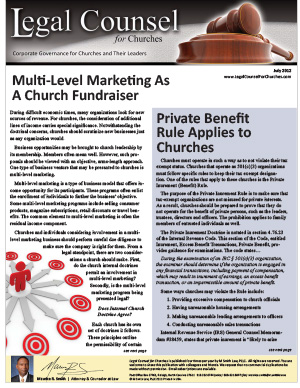During difficult economic times, many organizations look for new sources of revenue. For churches, the consideration of additional lines of income carries special significance. Notwithstanding the doctrinal concerns, churches should scrutinize new businesses just as any organization would.
Business opportunities may be brought to church leadership by its membership. Members often mean well. However, such pro- posals should be viewed with an objective, arms-length approach. One type of business venture that may be presented to churches is multi-level marketing.
Multi-level marketing is a type of business model that offers in- come opportunity for its participants. These programs often enlist the enrollment of individuals to further the business’ objective. Some multi-level marketing programs include selling consumer products, magazine subscriptions, retail discounts or travel ben- efits. The common element to multi-level marketing is often the residual income component.
Churches and individuals considering involvement in a multi- level marketing business should perform careful due diligence to make sure the company is right for them. From a legal standpoint, there are two considerations a church should make. First, do the church internal doctrines permit an involvement in multi-level marketing? Secondly, is the multi-level marketing program being presented legal?
Does Internal Church Doctrine Agree?
Each church has its own set of doctrines it follows. These principles outline the permissibility of certain activities. A church may not engage in a line of business that is outside the scope of its defined purpose. Leaders of a church should ensure that its activities do not conflict with the defined purpose of the church.
The charter and bylaws should not preclude the involvement in the prospective activity. Church policies may in fact dictate that all income be derived from tithes and offerings. If this is the case, marketing programs may be impermissible.
Is The Activity Legal?
When evaluating a program that offers income based on the subsequent enrollment of others, one should scrutinize the program with particular wariness. The first concern is to ensure that the program is not an illegal pyramid or chain scheme.
North Carolina criminal statutes define pyramid and chain schemes. North Carolina General Statutes §14-291.2(a) states that “No person shall establish, operate, participate in, or other- wise promote any pyramid distribution plan, program, device or scheme whereby a participant pays a valuable consideration for the opportunity or chance to receive a fee or compensation upon the introduction of other participants into the program, whether or not such opportunity or chance is received in conjunction with the purchase of merchandise.”
Churches should test the validity of businesses that offer income based on the recruitment of other participants. When in doubt, seek legal counsel to ensure the opportunity is legal and appropriate.

